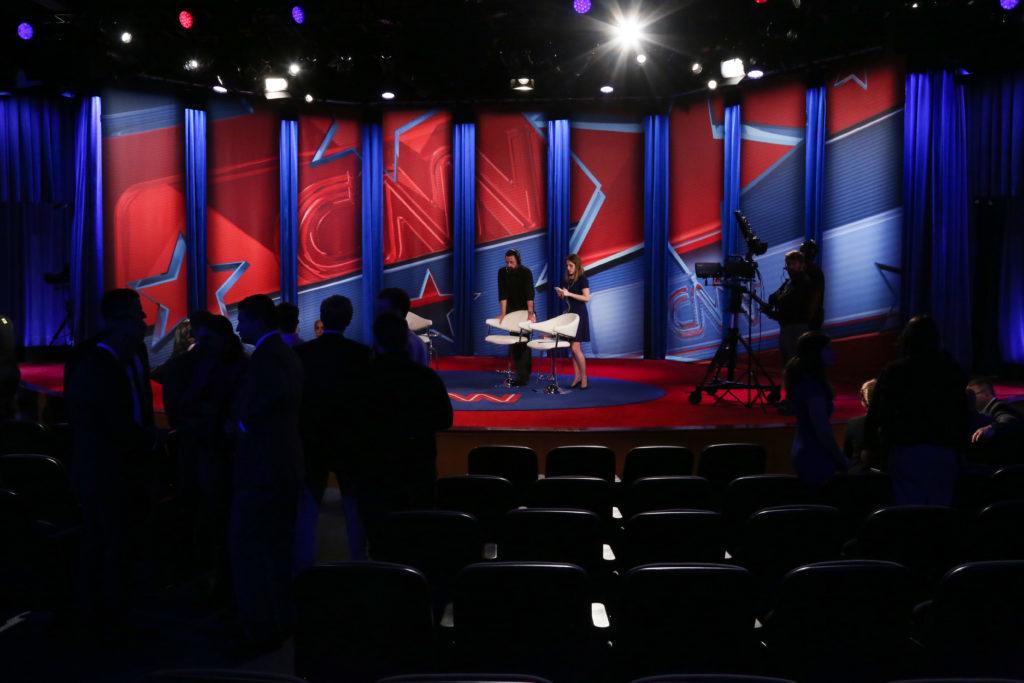The Jack Morton Auditorium has been transformed into a nighttime CNN set.
The network has hosted three town halls and one health care debate in the Media and Public Affairs building since January. Experts and students said these events, beamed to a primetime television audience in the millions, have raised the University’s national profile and give GW, a campus already known for its political activity, a more central role in today’s politicized world.
The made-for-television events have featured prominent political figures facing questions from CNN’s best-known journalists and audience members. Sen. Bernie Sanders, I-Vt. and House Speaker Paul Ryan spoke in January, Sanders returned in February to debate the future of health care with Sen. Ted Cruz, R-Texas, and Sens. John McCain, R-Ariz., and Lindsey Graham, R-S.C., discussed U.S. foreign policy last week.
At the town halls, students have questioned Ryan about plans to defund Planned Parenthood, pushed Sanders to name a positive attribute of President Donald Trump and asked McCain and Graham to explain their plans for defeating ISIS.
University spokeswoman Candace Smith said GW has hosted these high-profile events because of its “longstanding” relationship with CNN.
The network’s political debate show “Crossfire” was broadcast from the Jack Morton Auditorium from 2002 until 2005. Frank Sesno, the director of the School of Media and Public Affairs, was formerly CNN’s Washington bureau chief, the current head of the D.C. bureau, Samuel Feist, serves on SMPA’s National Council and Chief Political Correspondent Dana Bash, who moderated last week’s town hall, is an SMPA alumna.
We continue to look for opportunities to host such events that offer our students and faculty a front row seat to history.
Smith said Sesno was “instrumental in bringing the recent town halls to campus,” although SMPA was not involved in staging them.
“We continue to look for opportunities to host such events that offer our students and faculty a front row seat to history,” she said.
Primetime cable news viewers have gotten a look at GW during these broadcasts. The health care debate attracted about 2.5 million total viewers, making it the most-watched cable news program for the night among viewers aged 25 to 54 – a coveted demographic for TV networks – according to the network. About 1.5 million viewers watched Ryan’s town hall and 1.4 million tuned in for Sanders, TV Newser reported.
Mark Preston, a senior political analyst and the director of political programming for CNN, said in an email that the network “made a conscious decision” to incorporate more in-depth and personalized coverage of candidates in the 2016 election by staging town halls, which they continued in this year’s coverage.
“The town halls are important because it allows us to go deeper on specific subjects – beyond the sound bite – to help viewers better understand the complexities of the issues and in some cases the personalities of the people elected to represent the American people,” Preston said.
He added that the network has had links to GW, an institution he called “well-respected.”
Student Association Sen. Devan Cole, CCAS-U, said he worked for CNN in pre-production for all four events and attended the town halls featuring Ryan and Sanders. The events give GW “a bump up” in respect and would help draw politically-minded students to GW, he said.
“You can go to GW and maybe two blocks down from your dorm CNN has a big truck outside of SMPA and inside there’s a town hall debate with the Speaker of the House and one of the better reporters at CNN. I think that’s something that a lot of students will take pride in,” he said.
Jason Simon, the vice president of the higher education marketing firm SimpsonScarborough, said these events boost GW’s profile, relative to other universities in the area, especially at a time when political issues continue to captivate people throughout the country.
“Everyone else wants to be seen as having a political voice or having a role in shaping policy,” he said. “This only enhances that.”
It’s a really good opportunity to be around people that have different views than you and see them as human beings.
He said GW could feature these events in marketing campaigns and social media posts in order to create a “ripple effect,” using a one-day event to build the University’s long-term stature.
Simon said the town halls are valuable to GW not only for the high-profile speakers, but because they draw people who aren’t affiliated with the University to campus.
Christine Ford, a student in the Milken Institute School of Public Health, asked Ryan about Trump’s Twitter habits. At the event, Ford was seated in front of a woman who came to the U.S. as an undocumented immigrant and next to a Trump voter who blamed drugs pouring in from Mexico for his son’s fatal heroin overdose, she said.
“It’s a really good opportunity to be around people that have different views than you and see them as human beings,” she said.





